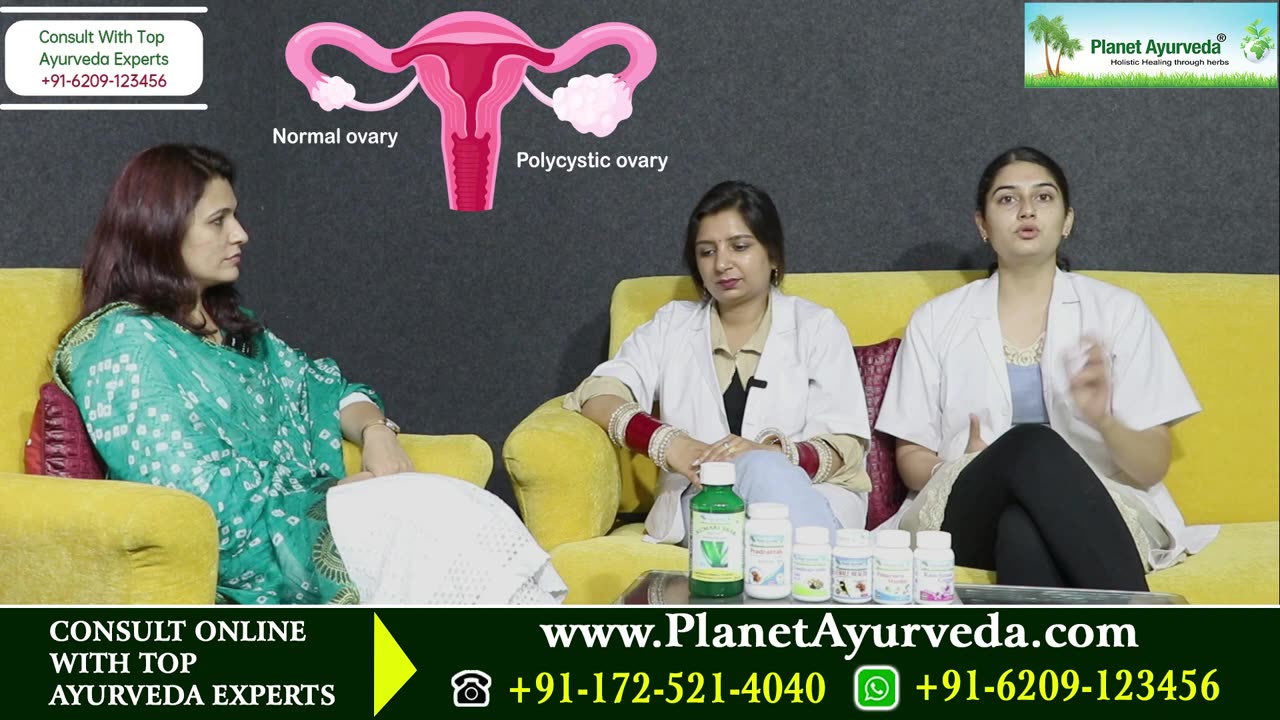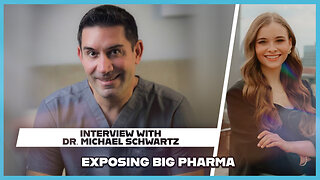Premium Only Content

All about PCOD & PCOS by Top Ayurveda Experts
All about PCOD & PCOS by Top Ayurveda Experts with International Experience of Healing with Ayurveda
Video Source:-
https://www.youtube.com/watch?v=BkNVJeVb3IE
Yoga for PCOD (Polycystic Ovarian Disease):-
https://www.youtube.com/watch?v=rv0gY8AnHsY
ANTI-OVARIAN CYST PACK:-https://store.planetayurveda.com/products/anti-ovarian-cyst-pack
Read More:-https://www.planetayurveda.com/library/polycystic-ovarian-disease
Book ONLINE Video Consultations with Ayurveda Experts from the Comfort of Your Home (+91) 842-749-4030( Whatsapp)
In this comprehensive video, we dive deep into the world of PCOD (Polycystic Ovarian Disease) and PCOS (Polycystic Ovarian Syndrome) to help you understand and manage these conditions naturally. You'll learn the key differences between PCOD and PCOS, their root causes, and the common symptoms that can affect your health.
Our top Ayurveda experts, with years of international experience in healing patients, will guide you through effective and natural ways to prevent complications associated with PCOD and PCOS. Discover insightful diet and lifestyle tips, natural home remedies, and specific yoga and pranayama practices designed to support your menstrual cycle and overall well-being.
Additionally, this video introduces you to 100% safe Ayurvedic herbal formulations that have been proven to help manage and treat symptoms related to PCOD and PCOS. Whether you're looking to balance your hormones, improve your reproductive health, or simply lead a healthier lifestyle, this video provides all the information you need to take control of your health naturally.
PCOD vs. PCOS:
What?
PCOD (Polycystic Ovarian Disease) is a condition in which a woman's ovaries produce immature or partially mature eggs in large numbers. Over time, these eggs develop into cysts within the ovaries. This leads to the ovaries becoming enlarged and secreting excessive amounts of androgens (male hormones), which can cause various symptoms such as irregular menstrual cycles, weight gain, acne, and hair thinning.
PCOS (Polycystic Ovary Syndrome) is a more severe metabolic disorder than PCOD. It is an endocrine condition that affects women of reproductive age and is characterized by multiple small cysts on the ovaries. PCOS is associated with a range of symptoms beyond those seen in PCOD, including significant hormonal imbalances, insulin resistance, obesity, and higher risks of developing conditions like type 2 diabetes, heart disease, and infertility.
Severity:
PCOD: Considered a milder condition; can often be managed with lifestyle changes and treatment.
PCOS: A more complex and serious metabolic disorder requiring comprehensive medical management.
Cause:
PCOD: Primarily related to hormonal imbalance and poor lifestyle choices.
PCOS: Involves hormonal imbalance, insulin resistance, and is linked to genetic and environmental factors.
Symptoms:
PCOD: Symptoms include irregular periods, weight gain, acne, and hair loss, but are usually less severe.
PCOS: Symptoms are more pronounced and include severe acne, significant weight gain, hirsutism (excessive hair growth), irregular periods, and more severe infertility issues.
Fertility:
PCOD: Women can still ovulate and have a relatively normal fertility rate with proper management.
PCOS: Women may struggle with ovulation and face higher infertility risks, requiring more intensive treatment to conceive.
Long-term Health Risks:
PCOD: Generally carries fewer long-term health risks.
PCOS: Associated with higher risks of developing type 2 diabetes, cardiovascular disease, and other serious health issues.
In summary, while both PCOD and PCOS involve ovarian cysts and hormonal imbalances, PCOS is a more severe and complex condition with broader health implications. Proper diagnosis and management by a healthcare professional are crucial for women experiencing symptoms of either condition.
Watch now and take the first step towards a healthier, more balanced life with the power of Ayurveda! Like, share, and subscribe to our channel for more content on healing and health.
-
 11:21
11:21
TimcastIRL
4 hours agoGOP Rep Says TWO SHOOTERS In JFK Assassination As FBI Uncovers TROVE Of Secret Documents
70.7K86 -
 1:04:55
1:04:55
Bare Knuckle Fighting Championship
3 days agoBKFC ITALY PRESS CONFERENCE | LIVE!
25.8K -
 10:04
10:04
Space Ice
2 hours agoThe Movie Silent Hill Is Like Resident Evil Without The Good Parts - Worst Movie Ever
14.1K4 -
 5:49
5:49
Hannah Barron
23 hours agoRedneck Euro Mount
12.8K19 -
 32:34
32:34
hickok45
7 hours agoSunday Shoot-a-Round # 268
3.56K8 -
 27:33
27:33
The Finance Hub
17 hours ago $1.98 earnedBREAKING: ALINA HABBA JUST DROPPED A MASSIVE BOMBSHELL!!!
28.6K53 -
 40:23
40:23
PMG
21 hours ago $0.62 earnedHannah Faulkner and Dr. Michael Schwartz | EXPOSING BIG PHARMA
16.2K1 -
 18:55
18:55
GBGunsRumble
19 hours agoGBGuns Range Report & Channel Update 15FEB25
11.5K -
 13:31:32
13:31:32
iViperKing
20 hours agoGood Times + Good Energy Ft. Whez.. #VKGFAM #RRR
99.2K13 -
 12:24
12:24
Winston Marshall
1 day agoWOAH! Bannon just Revealed THIS About MUSK - The Tech-Right vs MAGA Right Civil War Ramps Up
225K309